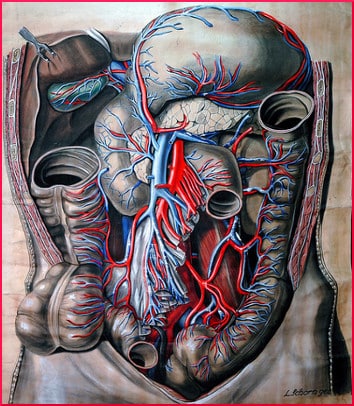Yesterday Childhood Obesity News discussed a study indicating that the correlation between obesity and an unbalanced gut microbiome could be more than coincidental, and might indeed be a cause-and-effect relationship. Researchers working with laboratory mice found that certain kinds of fecal microbiota, when introduced into the systems of normal-weight mice, could cause them to become obese.
The study in question was done at Washington University School of Medicine (in St. Louis) where co-author Jeffrey I. Gordon, MD, is director of the Center for Genome Sciences and Systems Biology. Another co-author was graduate student Vanessa Ridaura, whose team demonstrated that physical and metabolic traits can be transmitted from one individual to another when communities of gut microbiota are artificially introduced into their systems.
They were working on the suspicion, formed from the results of earlier animal experiments, that the microscopic inhabitants of the intestinal tract could somehow influence fatness. Their study was titled “Gut Microbiota from Twins Discordant for Obesity Modulate Metabolism in Mice” and when its findings first emerged, a report appeared at ScienceDaily.com, which published this description:
Germ-free mice that received gut bacteria from obese humans put on more weight and accumulated more fat than mice that were given bacteria from the guts of lean humans…this new study shows directly that microbial communities from the gut can transmit lean or obese traits…This transplantation of gut microbes from humans to mice led to metabolic changes in the rodents that are associated with obesity in humans.
The team began with human twins, but only certain kinds—pairs in which one twin was lean and one obese. From them, donor microbes were obtained. The recipients were mice that had been raised under sterile conditions, and so were starting out with no inner microbes of their own. Given identical food, the mice should have all weighed the same, but they didn’t. Something else was going on, and whatever it was, the difference was attributed to the different quality microbes that the subjects had received.
A Closer Look at Microbiomes
The lean animals were labeled Ln mice and the obese ones were called Ob mice. The next stage of the experiment depended on the rodents’ habit of consuming feces, a trait which is disgusting to humans but which facilitates the exchange of microbes between mice that are housed together. After ten days, it was apparent that Ob mice were influenced, in that they “adopted the “leaner” features—including the metabolic features—of their Ln cagemates.” Strangely, the exchange did not seem to have much effect the other way. The Ln mice did not seem to be troubled by ingesting microbes from their Ob cagemates. The interior colonies of Ln microbiota were more stable, and apparently not vulnerable to the influence of Ob-associated microbes.
There is more to say about this study and other, similar ones that followed in its wake, but before pursuing the subject further, we want to note that funding credit is due to the Crohn’s and Colitis Foundation of America, and the U.S. National Institutes of Health—all quite appropriate. Thanks to disclosure laws, the public is also aware of the potentially disturbing fact that the other sponsors were Kraft Foods and Mondelez International.
As we have seen, whenever a corporation delves into its pocket to subsidize academic research, there is reason for skepticism. Mondelez is a globe-encompassing concern whose slogan is, “World’s favorite snack brands—creating delicious moments of joy.” Kraft is the same old wine in a different bottle, especially since the recent merger with Heinz.
In their own estimation and according to their PR departments, corporate empires are all about community partnerships and making the world a better place. These are not bad goals, but when a corporate behemoth extends a helping hand to cash-strapped academia, it can’t hurt to keep an eye on the situation.
Your responses and feedback are welcome!
Source: “Human gut microbes alter mouse metabolism, depending on diet
ScienceDaily.com, 09/05/13
Image by Double-M


 FAQs and Media Requests:
FAQs and Media Requests: 











